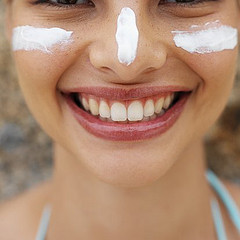Could sunscreen be dangerous?
 Thanks to the brutal heat washing over much of the nation today, many people are thinking about sun protection, including writers at The New York Times. They’ve opened up debate about the safety of sunscreen itself, whether chemicals in the stuff we dutifully cover our skin with each summer could hurt us.
Thanks to the brutal heat washing over much of the nation today, many people are thinking about sun protection, including writers at The New York Times. They’ve opened up debate about the safety of sunscreen itself, whether chemicals in the stuff we dutifully cover our skin with each summer could hurt us.
Policy makers and scientists approved chemicals in sunscreen back in the ’70s before subsequent studies found they might not be so safe. Some say there’s reason to worry that sunscreen could cause exactly what we’re trying to prevent: skin cancer. Sen. Chuck Schumer (D-NY), according to the piece, is pushing for more FDA research on the possible link between skin cancer and retinyl palmitate found in much sunscreen. Vitamin A, an active ingredient in more than 40 percent of all sunscreens, might stimulate gowth of skin tumors and lesions when applied in the sun, said Sonya Lunder. It’s bad news for cosmetics companies who champion the vitamin’s health value. Said Lunder:
The cosmetics industry aggressively markets products with Vitamin A ingredients claiming they rejuvenate skin. This may be safe for products used indoors, but there is a real possibility of harm when used on sun-exposed skin. In the study, tumors and lesions developed up to 21 percent sooner in sun-exposed lab animals coated with a vitamin A-laced cream than among animals treated with a vitamin-free cream.
Jennife Parrish of the Santa Cruz Sentinel wrote last week that the FDA still has yet to enact sunscreen safety regulations dafted in 2007, and the International Agency for Research on Cancer reported users of sunscreen have show a higher isk of melanoma than non-users — in other words, it may be that while sunscreen prevents sunburn and reduces the risk of squamous cell carcinoma, the most common form of skin cancer, it might increase the risk of developing deadly melanoma. This may be related to the behavior of those who use sunscreen most — serious sun bathers who may have a false sense of security — than of sunscreen itself, but some health officials say the jury’s still out.
It sounds like we’re darned if we do, darned if we don’t. It seems especially critical then that the FDA work to develop new, safe, advanced forms of sunscreen, as some of the Times’ other guests suggest. A few argue for clearer labels and improved consumer education of the harmful effects of UVA rays in addition to UVB rays, which is what we mostly pay attention to now. Until then, umbrella and straw hat, anyone?
Thanks to the brutal heat washing over


